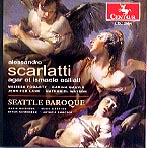This opera-pretending-to-be-oratorio (opera was banned in Rome during the period in which the work was composed) offers an excellent way to discover and appreciate Alessandro Scarlatti’s vocal/dramatic facility and his engaging manner of setting melody to appropriately varied, effectively complementary accompaniment. We enter the famous Abraham/Sarah/Hagar/Ishmael story (from Genesis, chapter 21) at the point where Abraham’s wife Sarah insists that he must banish the slave Hagar and her son Ishmael to protect their own son Isaac’s inheritance. (Ishmael was fathered by Abraham at the urging of the then-barren Sarah, who later–to everyone’s surprise–bore a son, Isaac.) The anguished father very reluctantly agrees to banish the two, who end up nearly dying in the desert but are eventually, at the oratorio’s end, saved by an Angel. All of the drama in this two-part work centers on the interaction of the four main characters (plus the Angel, who delivers the final aria)–there are no choruses or significant orchestral sections save for the opening four-minute Sinfonia. Its 78-plus minutes contain well-written arias (both accompanied by continuo and by orchestra), smoothly flowing recitatives, and occasional duets. It’s a very compact, tightly constructed piece of theatre that moves right along, and it’s filled with lovely music.
I first was attracted to this because of the presence of soprano Karina Gauvin, an invariably exciting singer, clear and captivating of voice and musically intelligent. She doesn’t disappoint here, whether as the firm yet loving Sarah or the reassuring Angel. But the real star is soprano Melissa Fogarty, who as Ishmael delivers her arias with a marvelous range of color and nuance, perfectly capturing and conveying the victimized boy’s array of emotions. Her performance in Part Two, where Ishmael and Hagar desperately face death in the desert, is outstanding, whether in the duets or in her extended recitatives and arias. As Hagar, mezzo-soprano Jennifer Lane also is excellent, especially as things become more serious in the oratorio’s second half.
The only one who doesn’t seem to know that this is a drama is baritone Nathaniel Watson, who sings well enough but puts little emotion into it and doesn’t give us a real sense of Abraham’s character or his conflicted state throughout the work. However, since most of the singing is done by the women and the action moves quickly, it’s not difficult to accept this one weakness in the performance. The instrumental playing is excellent, and the continuo players are particularly notable for their sympathetic accompaniments. The chitarrone flourish that introduces the Angel is a suitably surprising and very effective touch, as is the hopeful sentiment that closes the work: “Violets bloom after frost and cold.” The sound gives ample and agreeable presence to voices and instruments, adding up to a first-rate release.
































